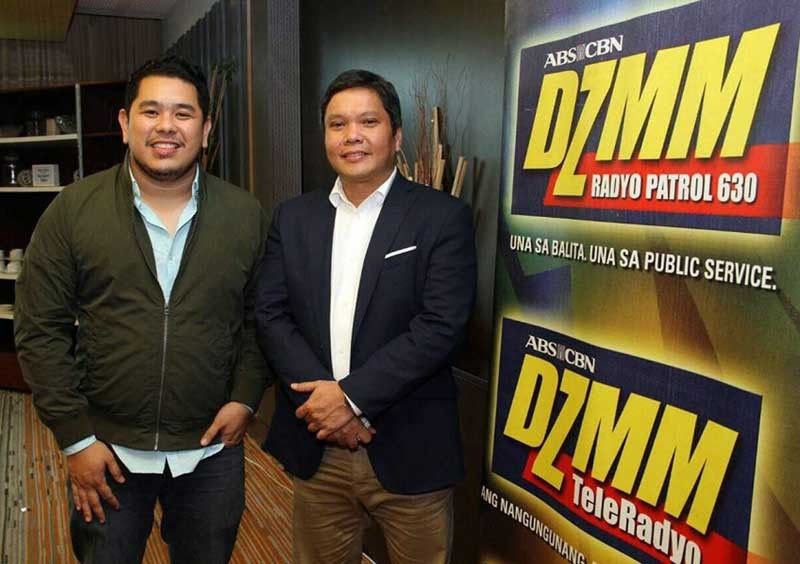Disaster education needs star power

MANILA, Philippines — Celebrities are being urged to take an active role in raising public awareness and preparedness for disasters.
For journalist Jeff Canoy and Project NOAH director and geologist Prof. Mahar Lagmay, hosts of the radio program DZMM Red Alert (with survival and disaster expert Dr. Ted Esguerra completing the hosting trio), entertainment personalities have the power and following to engage the masses in the conversation on hazards and how to plan ahead of disasters.
Any talk on disaster preparedness and response is welcome given that the Philippines is one of the Top 5 countries most frequently affected by natural disasters over the last decade, according to the Annual Disaster Statistical Review 2016. It has also been described by experts as one of the most vulnerable countries to climate change, bearing the brunt of such impacts as “extreme weather events.”
“For any important information that the public should know, we hope to be able to tap popular people. They can provide information. In entertainment, these are the disaster ambassadors — sila yung may dikit sa masa eh (masses connect with them). Dun sa mga tao na gusto nila na nagbibigay sa kanila ng balita, mga impormasyon at para gumalaw din sila (People want them to give them news and information so that they are also moved to act),” said Lagmay in a recent presscon.
Noting that an actor’s tweet, even if it’s just a hello, can possibly generate a lot more retweets or likes over a tweet about an incoming typhoon by an agency or person of authority, the disaster scientist acknowledged that to get the people engaged, “you have to get their kiliti (interest) and normally, the kiliti is in entertainment.”
“So, I think that’s one kind of responsible use of social media — using their reputation and popularity to help our disaster-preparedness efforts in the country,” said Lagmay, adding that Kuya Kim Atienza and Anne Curtis used to be disaster ambassadors for Project NOAH, a hazard and risk monitoring program now under the University of the Philippines.
For his part, Canoy shared that in Red Alert, they have had in the past few months Kapamilya actors like Kathryn Bernardo and the love team of Enrique Gil and Liza Soberano who helped disseminate safety and emergency tips.
“We get information from the experts. We would write down how to give advice and tips to people in times of emergencies. Then they (actors) are ones who will deliver (these messages). We use this for social media,” Canoy said.
He said these celebs, through their social media presence and reach, have been a big help in pushing forward the message on how to be ready when an emergency happens or a disaster strikes. “I’m grateful to all the artistas who have helped us push the advocacy na ligtas ang may alam.”
Tapping artists is part of what Lagmay described as a “trans-disciplinary approach” to disaster preparation and planning, which they get to apply also on the award-winning DZMM Red Alert, which offers hard and fast information on emergency and disaster preparedness on DZMM Radyo Patrol 630 and DZMM TeleRadyo every Sunday at 10 a.m. Canoy said don’t be surprised if there’s singing on the show in between talks on personal and public safety because they invite singers to perform songs about environment protection or scriptwriters to discuss their movies with similar topics.

Survival expert Ted Esguerra is also a host on the radio show
This is because disaster awareness isn’t just about science and technology, Lagmay explained. “It has to be embraced by the people and we have to understand their mindset. We need psychologists, social scientists, anthropologists, sociologists, as well as artists, musicians and composers who can write songs about calamities so in that way, kids can sing it, like how I discovered that the Philippines was discovered by Magellan in 1521 (was) through the song of Yoyoy Villame. It is just a song, but you learn. Entertainment is important.”
Citing the example of Hollywood stars like Brad Pitt or Leonardo DiCaprio as ambassadors for climate change, Lagmay added, “The popular ones, they should help broadcast these things, kinikiliti ang mga tao para mag-engage sa mga disaster awareness, para mapababa natin, kung hindi man maging zero casualty, in the event of a disaster.”
Meanwhile, Canoy, who’s fresh from being honored by the Cannes Corporate TV Awards in France and the prestigious Palancas for his works on the Marawi siege, is proud of his “tandem with Prof. Mahar and Doc Ted” on the radio program. Lagmay brings to the table science, Dr. Esguerra tells listeners what to do, while the TV reporter brings in stories and learnings from covering calamities and conflict for 10 years now.
Canoy joined DZMM Red Alert last year when he also took over the anchor duties of Red Alert on ABS-CBN. Asked on his most unforgettable coverage on disasters (whether man-made or natural), he cited last year’s Marawi siege, which he covered for five months. For staying so long in Marawi, he shared, “Pwede na yata akong mag-pa register and bumoto dun. It was a heartbreaking coverage because so many lives were lost, both soldiers and civilians.”
Canoy also related that whenever he attends conferences abroad, foreigners get shocked to know that reporters from the Philippines have experienced all kinds of disasters, from typhoons, volcanic eruptions, to landslides and wars. “Not all countries experienced (those things), but for some strange reason, here in the Philippines, especially for Pinoy journalists, we are used to (covering) those types of stories. That’s what makes Filipino journalists different, talagang baon natin ang experience over there.”
As for the response of Pinoys to disasters, one thing he noticed is “tumatawa pa rin, yun yung weird eh.” During his Typhoon Ompong news coverage last month, for example, he encountered a family that lost their home. When he interviewed them though, the first question they asked him, “Ano na daw ang mangyayari sa Ang Probinsyano sa Monday kasi wala silang kuryente (laughs)? So, you know that kind of laughter? They’re facing a huge challenge but they still manage to make themselves feel better. I think that’s very Filipino. In spite of everything, they still see light in the middle of the dark.”
When asked about his own lessons from past disasters, Lagmay shared his learning experience from the Guinsaugon tragedy in Southern Leyte in 2006 where over a thousand lives were buried beneath a landslide that was almost as big as the UP Diliman campus. “The houses (disappeared) and how do you find them with a landslide that big? From there, we learned that we need to know the GPS (global positioning system) coordinates (of the houses).”
Those learnings proved to be most useful in the recent landslide tragedy in Naga, Cebu. “We identified the GPS points. Pagdating namin dun, bodies recovered were 15, pero paglabas namin, isang araw pa lang, naging 42 kaagad nakuha, kumbaga pwede natin magamit ang science para mapabilis yung paghahanap. And the faster the search, the bigger chance to find people alive,” he said.
For all the Filipinos’ resilience and fighting spirit, Lagmay believes that so much still needs to be done. That’s why he fully supports the House Bill 8165 or an act creating the Department of Disaster Resilience, particularly for its provisions on Open Data and Probabilistic Risk Assessment, which he hopes will be retained in the final version. “If you have science and technology, and you want to teach it to people and communities, the barangays, kailangan mo sa science na pagkatiwalaan ka, hindi yung basta-basta isusubo yun. (It’s important) that science is open and can be understood and the methodology can be applied… Science must be repeatable. So, you need to open those information and the data, and to share them.”
He also thinks that disaster preparation is more effective and the use of the budget is more systematic if agencies unite under “one direction, one leadership and one department.”
- Latest
- Trending





























